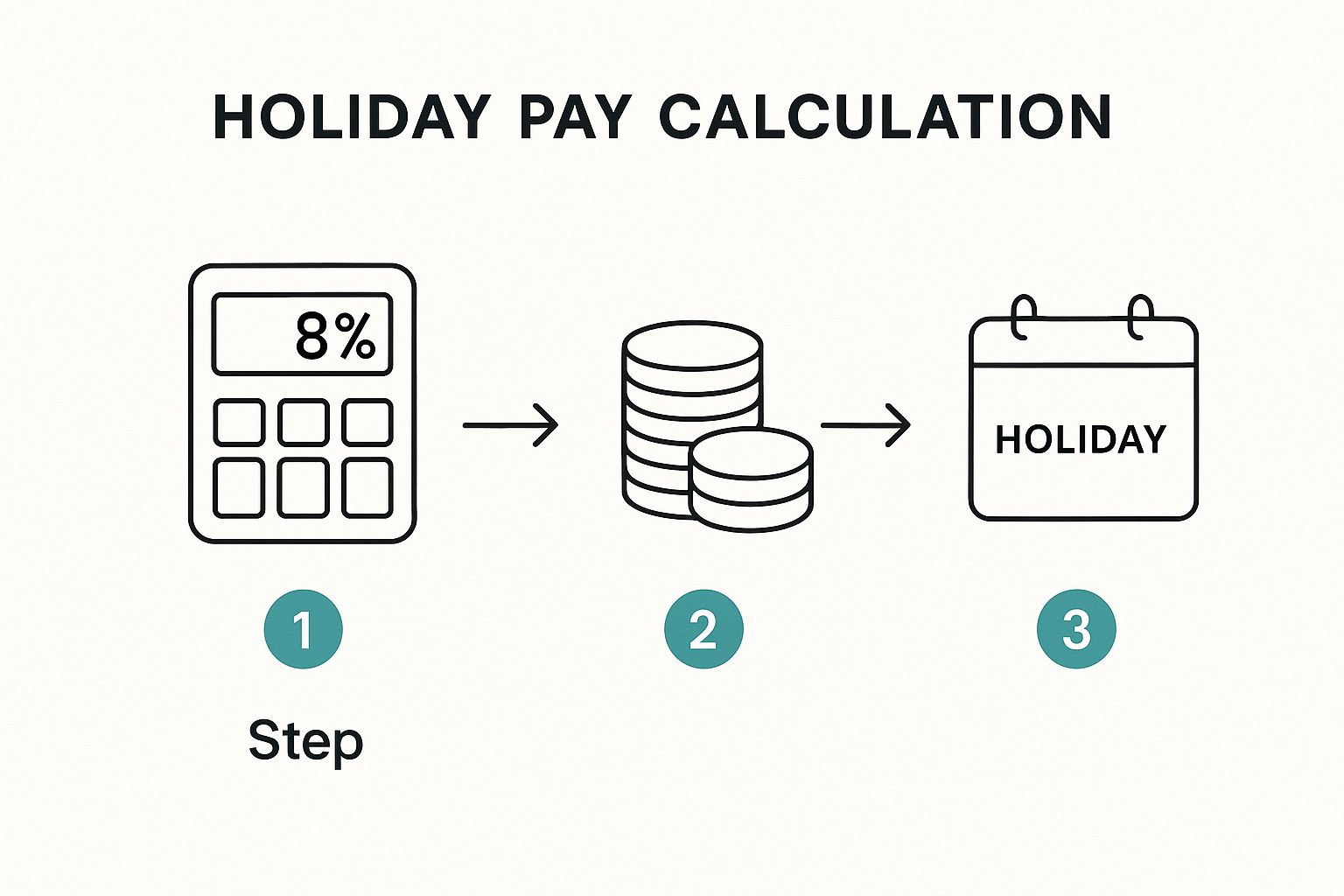Understanding Holiday Entitlement on a Zero Hour Contract

Yes, you absolutely get paid holiday entitlement on a zero hour contract. It's a common misconception that flexible hours mean fewer rights, but UK law is crystal clear on this. You're legally entitled to the same 5.6 weeks of statutory annual leave as a full-time employee.
The only real difference is how you build up that time off. Instead of a fixed amount from day one, your entitlement is calculated 'pro-rata', meaning it grows in direct proportion to the hours you actually work.
Your Holiday Rights on a Zero Hour Contract

It’s easy to see why people on flexible contracts worry about missing out, but the idea of 'zero hours, zero holiday' is a myth. Your employer is legally required to provide paid time off, no matter how much your schedule fluctuates week by week.
This legal protection is all about fairness. It ensures you're treated on a par with colleagues who have fixed-hour contracts. The fundamental principle is simple: the holiday you get should be a fair reflection of the work you've put in.
The Pro-Rata System Explained
So, what does 'pro-rata' actually mean in practice? It simply means 'in proportion'. For a zero-hour contract worker, your pot of available holiday time grows with every single hour you work. This is really the only fair way to manage leave when your schedule isn’t predictable.
Think of it this way: someone on a fixed 40-hour week builds up their 5.6 weeks of holiday at a steady, predictable rate. As a zero-hour worker, you might earn more holiday in a busy month and less during a quiet one, but it always tracks back directly to your logged hours.
The crucial takeaway is this: you earn holiday for the time you work. This system is designed to provide fair entitlement to workers whose hours are not fixed, ensuring everyone benefits from paid time off.
This isn't just good practice; it's the law. Under the UK's Working Time Regulations 1998, zero-hour contract workers are legally entitled to the same statutory holiday as everyone else—5.6 weeks, which often translates to 28 days for full-time staff. To see how these rules play out, you can learn more about zero hours holiday pay regulations and their practical application.
A Direct Comparison: Full-Time vs Zero Hour
To really get a handle on how your rights stack up, seeing a direct comparison can be incredibly helpful. While the total potential leave is the same, the way you earn and calculate it is quite different.
The table below breaks down the key distinctions and similarities, giving you a clear snapshot of your legal standing. Understanding where you align—and where you differ—from a full-time employee is the first step to confidently managing your annual leave.
Holiday Rights At a Glance: Full-Time vs Zero Hour Contracts
| Right / Feature | Full-Time Employee (e.g., 40 hours/week) | Zero Hour Contract Worker |
|---|---|---|
| Statutory Entitlement | 5.6 weeks (or 28 days) per year. | 5.6 weeks per year, accrued pro-rata. |
| Accrual Method | Entitlement is known from the start of the leave year. | Holiday is earned as hours are worked. Accrual rate is 12.07% of hours worked. |
| Pay Calculation | Paid at normal weekly wage. | Holiday pay is based on average pay over the previous 52 paid weeks. |
| Bank Holidays | Often included in the 28-day entitlement. | No automatic right to paid bank holidays unless hours are worked and holiday is booked. |
| Booking Leave | Usually straightforward, booked in days or half-days. | Can be more complex; may be booked in hours or days depending on the employer's system. |
Seeing it side-by-side makes it clear that while the mechanism is different, the core right to paid time off is exactly the same. Your flexible contract doesn't mean you lose out on this vital entitlement.
Calculating Your Accrued Holiday Hours
Right, let's get down to the brass tacks: working out exactly how much holiday time you've actually earned. The standard, government-backed method uses a specific accrual rate of 12.07%.
This figure isn't just pulled out of thin air. It’s calculated by taking the statutory 5.6 weeks of holiday entitlement and dividing it by the remaining 46.4 working weeks in a year (52 weeks - 5.6 weeks).
Every single hour you work directly builds up your pot of paid time off. This percentage is simply the mechanism that makes sure the calculation is fair and legally sound.
The 12.07% Rule in Action
Putting this into practice is surprisingly simple. All you need to do is multiply the total hours you've worked in a pay period by 0.1207. The number you get is the amount of holiday, in hours, that you've just accrued.
Let’s use a proper example. Imagine you're a student working flexible shifts at a local pub to fit around your lectures. Last month, you look at your timesheets and see you worked a total of 75 hours.
- Here's the sum: 75 hours worked x 0.1207 = 9.05 hours
Just like that, you've earned just over nine hours of paid holiday from that month's work. You can do this quick calculation for any period to keep tabs on your entitlement, which is a great way to double-check it matches what your employer has recorded.

This infographic gets to the heart of it – a set percentage of the hours you put in gets converted into paid leave, creating a direct link between your effort and your well-deserved rest.
More Real-World Examples
The best thing about the 12.07% method is that it works no matter how much your hours fluctuate. Whether you work a steady pattern or your shifts are all over the place, the maths stays the same.
Think about these common scenarios:
- A seasonal events steward: You work flat out over the summer festival season, clocking up 180 hours in August. Your holiday accrual for that month would be 21.73 hours (180 x 0.1207). But in a quiet month like November, you might only work 40 hours, earning 4.83 hours of leave.
- A delivery driver with variable shifts: Your weekly hours are completely dependent on parcel volume. One week you might work 35 hours, and the next, just 15. After a four-week period totalling 110 hours, you would have earned 13.28 hours of holiday (110 x 0.1207).
Getting your head around this calculation is the most powerful thing you can do. It gives you the confidence to check your payslips and have a proper, informed conversation with your manager if you think something’s not quite right.
This is the accepted industry standard, and for a deeper dive into annual leave in general, our comprehensive guide on how to calculate annual leave entitlement in the UK is a great resource.
How Is Holiday Pay for Zero-Hour Contracts Calculated?
Okay, so you’ve worked out how many holiday hours you’re entitled to. The next logical question is, "What will I actually get paid for that time off?" This is where it gets a bit more involved for zero-hour contracts, because your pay obviously isn't a fixed amount.
To make it fair, UK law sets out a specific method. Your employer can’t just pick a low-earning week and base your holiday pay on that. Instead, they must calculate your average pay over a 52-week reference period to get a true picture of your typical earnings.
The 52-Week Reference Period Explained
So, what does this "reference period" actually mean? It’s simpler than it sounds.
Your employer has to look back at the last 52 weeks where you actually earned money. This is a really important point: if you had a week with no hours and therefore no pay, that week gets ignored. They keep going back until they've collected 52 weeks of pay data.
The law gives them a limit, though. They can go back a maximum of 104 weeks (that's two years) to find those 52 paid weeks. This is a safety net to ensure that a recent quiet period at work doesn’t unfairly tank your holiday pay rate.
Once they have those 52 weeks of pay data, they just add it all up and divide by 52. The result is your average weekly pay, and that’s what you should receive for a week of holiday.
This system is designed to give you a fair payment that reflects what you normally earn. It stops your holiday pay from being skewed by a single quiet week, giving you a much more reliable figure when you book time off.
The principle of basing pay on average hours worked is common across different types of flexible contracts. For a closer look at how this works for part-time staff, have a read of our guide on how to calculate pro-rata holidays for UK employees.
A Worked Example of Holiday Pay Calculation
Let's make this real. Imagine Alex, who works in a warehouse on a zero-hour contract and wants to take a week off. Here's how his employer would figure out his holiday pay.
First, they’ll look back at Alex's pay history. In the last 60 weeks, they see he had 8 weeks where he wasn’t offered any shifts. These unpaid weeks are skipped. They simply continue looking back until they have the most recent 52 weeks where Alex was paid.
Next, they add up his total gross earnings from those 52 weeks. Let's say it comes to £18,200.
Finally, they divide that total by 52 to find his average weekly pay. The calculation looks like this:
£18,200 (Total Earnings) ÷ 52 (Weeks) = £350 (Average Weekly Pay)
So, Alex will be paid £350 for his week of annual leave.
This table gives a simplified breakdown of the steps involved in that process.
Sample 52-Week Holiday Pay Calculation
| Step | Action | Example Calculation |
|---|---|---|
| 1 | Identify the relevant reference period | Look back up to 104 weeks to find the last 52 weeks where the employee was paid. |
| 2 | Sum the total gross pay | Add up all earnings from those 52 weeks. For Alex, this was £18,200. |
| 3 | Calculate the average weekly pay | Divide the total pay by 52. |
| 4 | Determine the holiday pay | The result is the pay for one week of leave. £18,200 ÷ 52 = £350. |
If Alex just wanted to take a single day off, his employer would typically divide this weekly figure by the average number of days he works a week. If he usually works five days when he gets shifts, his pay for one day of leave would be £70 (£350 ÷ 5).
Common Mistakes and Problems to Avoid

Navigating your holiday entitlement on a zero-hour contract can feel like a minefield. It's all too easy to run into confusing or incorrect practices from employers, so knowing the most common pitfalls is your best defence against being short-changed.
One of the biggest red flags is a practice called 'rolled-up' holiday pay. This is where an employer bumps up your hourly rate by a small amount, telling you it’s your holiday pay included. While it might sound simple, it's unlawful. Why? Because it actively discourages you from taking a proper break from work.
Your holiday pay should be paid at the time you take your leave, not trickled into each payslip. If you spot an extra percentage labelled "holiday pay" on your wage slip, it’s time to ask some serious questions.
Incorrect Pay Calculations
Another all-too-common issue crops up with how holiday pay is actually worked out. Some employers mistakenly calculate your pay based only on your basic hourly rate. This is wrong. It needs to include any regular overtime, commission, or bonuses that make up your normal earnings.
That's precisely what the 52-week averaging method is for—to capture those variable payments and give you a fair reflection of what you typically earn.
It's also a problem when an employer gets the 52-week reference period wrong. A classic mistake is including weeks where you didn't work at all, which drags your average pay down unfairly. Remember, only the weeks you actually got paid for should count.
A significant number of workers on flexible contracts simply aren't aware of their full rights. This knowledge gap can unfortunately lead to employers making mistakes—or worse, taking advantage—without being challenged.
This lack of awareness is a widespread issue. Research from Acas highlighted that a staggering 60% of workers on zero-hour contracts didn't know their rights, including their full entitlement to 5.6 weeks of paid annual leave. It's well worth reading up on how zero-hour contracts are handled in the UK to stay informed.
Leaving Your Job and Untaken Holiday
Finally, a crucial point to remember is what happens when you leave your job. An employer can't just tell you that you lose any holiday you haven't taken. You are legally entitled to be paid for any statutory holiday you've accrued but not used by your final day.
This payment in lieu should be calculated using your average pay and included in your final payslip. Always check that final payment carefully. If you think there’s a mistake, raise it with your employer in writing immediately, referencing your own records.
If you can't resolve it directly, organisations like Acas offer free, impartial advice to help you get what you're owed.
Why Getting to Grips With Your Holiday Rights Is So Important
If you’re working on a zero-hour contract, you're in good company. This kind of flexible work is now a massive part of the UK job market, especially in fast-moving industries like hospitality, retail, and healthcare, where staffing needs can flip overnight.
This isn’t some niche employment issue; it's the reality for a huge slice of the modern workforce. That's precisely why the rules around holiday pay for casual workers are so critical.
To put it in perspective, back in September 2017, the Office for National Statistics (ONS) found that over 900,000 people were on these contracts. That’s 2.9% of everyone in employment at the time and a big jump from 747,000 just the year before. It shows just how much certain sectors rely on this way of working. You can dig deeper into these trends in the UK's official statistics on zero-hour contracts.
Simply knowing what you're entitled to is the most powerful first step you can take. It ensures you’re treated fairly in a work setup that can often feel unpredictable. Without that knowledge, you could easily be missing out on pay you’ve legally earned.
It's About Your Well-being and Your Wallet
Your holiday entitlement on a zero hour contract is more than just a bit of extra cash; it’s a legal right designed to protect your health. Paid time off gives you a chance to rest and recharge, preventing burnout. That’s vital for any job, but even more so when your hours are all over the place.
Financially, it’s simple: unclaimed holiday pay is money you’ve worked for but haven't received. Over a full year, that can add up to a pretty hefty sum that you’re legally owed.
Taking control of your entitlement means you are not just an employee but an informed participant in your working relationship. It empowers you to verify payslips, ask informed questions, and ensure your employer is meeting their legal obligations.
Ultimately, being proactive here protects both your health and your bank balance. It turns your legal rights from words on a page into a real, tangible benefit that supports your life. This knowledge is what gives you the confidence to manage a flexible working life on your own terms.
Your Go-To Checklist for Holiday Pay
Let’s pull all this information together into a practical, no-nonsense checklist. Think of this as your quick reference guide to make sure you’re getting what you’re owed and feel confident about your holiday entitlement on a zero-hour contract. Following these steps will help you stay on top of your rights.
The single most important thing you can do is be your own best advocate, and that starts with keeping good records. A simple log of the hours you work each week, which you then check against your payslips, is the most powerful tool you have.
Lock Down Your Fundamental Rights
First up, let's get the basics absolutely clear. Don't ever let an employer convince you that having flexible hours means you don't get paid leave. Your core rights are set in stone by UK law and are not up for debate.
- You get 5.6 weeks: Just like any other worker, you are legally entitled to 5.6 weeks of paid annual leave. This is the bare minimum.
- It’s pro-rata: Your holiday entitlement builds up based on the hours you actually work. Put simply, the more you work, the more paid time off you earn.
- You’re paid when you take the time off: Holiday pay must be paid when you’re on leave. It should never be an extra few quid added to your hourly rate.
Keeping these three principles in mind is your first line of defence. They give you a solid foundation to quickly spot if something doesn't feel right with your employer's holiday policy.
Get Comfortable With the Key Calculations
Next, it's time to get familiar with the maths. You don't need to be an accountant, but understanding the two main formulas gives you the power to double-check your employer’s figures and have a productive conversation if something looks off.
1. How to Calculate Your Holiday Accrual (The 12.07% Method) This is the standard way to figure out how many hours of holiday you've earned.
- The formula: Total Hours Worked x 0.1207 = Holiday Hours Accrued.
- What to do: Get into the habit of applying this to your own timesheets. For instance, after working 100 hours, you know you've earned 12.07 hours of paid leave.
2. How to Calculate Your Holiday Pay (The 52-Week Average) This is the method your employer legally has to use to work out how much to pay you for your leave.
- The process: They must calculate your average weekly pay by looking back at the last 52 weeks in which you were actually paid.
- What to do: If you take a week off, make sure your holiday pay reflects what you typically earn over the last year, not just what you made during a recent quiet spell.
Learn to Spot Unlawful Practices
Finally, keep an eye out for common red flags. Knowing what's against the law is the best way to protect yourself from being treated unfairly.
- Beware of "Rolled-Up" Holiday Pay: If you notice an extra sum on your payslip marked 'holiday pay' instead of getting it when you're actually off, this is an illegal practice.
- Don't Forget Payment for Untaken Leave: If you leave your job, your employer must pay you for any holiday you've accrued but haven't used. This should be included in your final payslip.
If you’re ever in doubt, the official resources are your best bet. The GOV.UK website has straightforward guidance, and organisations like Acas provide free, impartial advice to help you navigate any problems.
Common Questions Answered
When you're working on a zero-hour contract, figuring out the specifics of your holiday rights can feel a bit tricky. Let's tackle some of the most common questions that pop up.
What Happens if I Don’t Use All My Holiday?
This is a big one. UK law is clear: your employer must give you the chance to take your statutory holiday. They can't just let it slide, and they should actively encourage you to take your breaks.
The standard 5.6 weeks of statutory leave generally can't be carried over to the next year. There are a couple of rare exceptions, like if you've been on long-term sick leave, but that's about it. Most importantly, your employer cannot pay you for this leave instead of you taking it—unless you're leaving the company.
Do I Get Bank Holidays Off?
This really depends on your employer's policy. Many people assume bank holidays are an automatic extra, but they're not. An employer can include the bank holidays as part of your total 5.6 weeks of annual leave.
There's no legal right for a zero-hour worker to have bank holidays off, nor is there a right to get extra pay for working them. The first place you should always look is your contract or the company handbook. It will spell out exactly how they treat public holidays.
The key thing to remember is that your total entitlement is 5.6 weeks. How bank holidays fit into that picture is entirely down to your contract, not a given.
How Do I Actually Book Time Off?
The process for requesting holiday should never be a mystery. Your employer should have a clear procedure outlined in your contract or staff handbook, so be sure to follow it.
As a rule of thumb, the standard notice period is usually double the length of the holiday you want to take. So, if you want a week off, you'll need to give at least two weeks' notice. Your employer can say no to a request, but they have to give you a solid business reason and let you know in good time.
Keeping track of leave for a flexible team can quickly become a headache. Annual Leave Tracker takes the pain out of the process by automating holiday calculations and giving everyone a straightforward way to book and approve time off. It gets rid of the messy spreadsheets for good. Find out more at https://www.annualleavetracker.com.
Article created using Outrank
Ready to Transform Your Leave Management?
Join 500+ companies using Annual Leave Tracker to streamline their HR processes.


